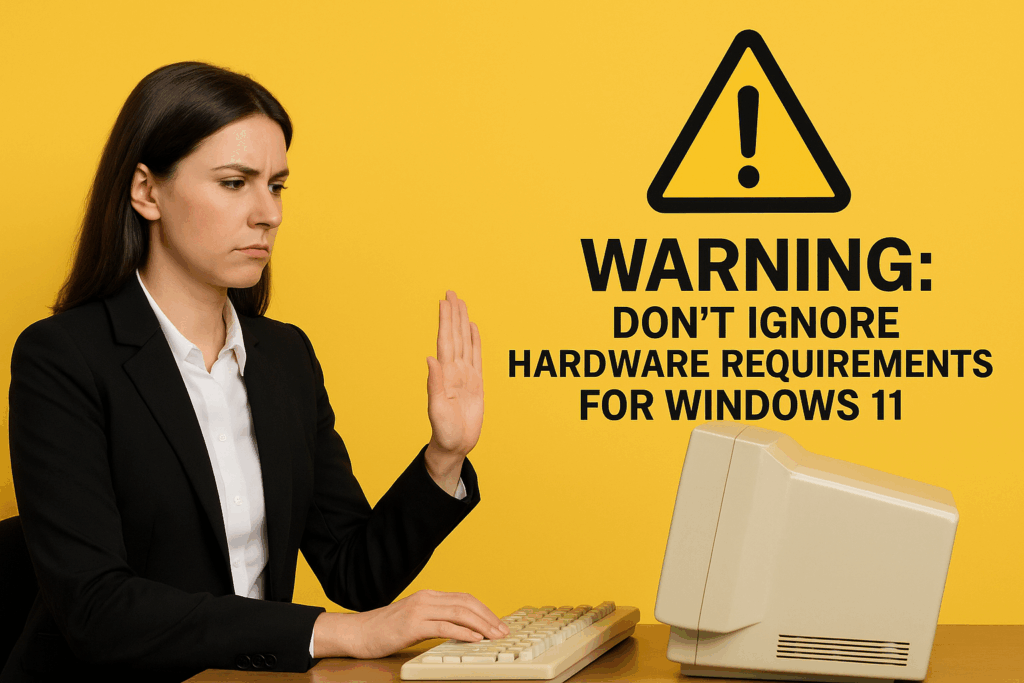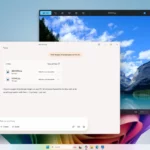Wake-up call: Up to 60% of Windows 10 PCs can’t meet the Windows 11 hardware requirements. As a result, many businesses remain stuck on outdated, unsupported systems with growing security risks.
At first, upgrading might seem straightforward. You install Windows 11, excited about the sleek design and new features. However, instead of improved performance, your computer slows down, updates fail, and errors appear without warning. This frustrating scenario is exactly what happens when Windows 11 is forced onto unsupported hardware.
Moreover, even if you’ve already managed to get Windows 11 running on older Windows 10 PCs without obvious issues today, the cracks will appear sooner or later. Major updates, evolving security features, and driver changes eventually reveal weak hardware foundations. What seems stable now can quickly become unsafe down the line.
Why Windows 11 Hardware requirements Matter
To put it simply, Windows 11 hardware requirements are not optional—they are essential. Think of Windows 11 like a modern office building. You can decorate it beautifully and fill it with the latest furniture, but if the foundation is weak, the entire structure is at risk.- TPM 2.0 is the secure vault in your foundation, protecting passwords, encryption keys, and sensitive data from attack.
- UEFI with Secure Boot ensures only trusted “building blocks” are allowed in when your device starts up.
- Processor, RAM & storage provide the structural strength. Without them, the system strains under pressure, leading to slowdowns and instability.
- Graphics and display compatibility ensure your workspace functions properly, with clear visuals and feature support.
The Risks of Ignoring the Rules
Yes, it is technically possible to force Windows 11 onto older hardware. Nevertheless, doing so is like constructing an office on cracked concrete. Initially, it might seem to hold, but over time the stress becomes visible. Updates begin to fail, errors multiply, and Microsoft will not provide support. Therefore, your business is left exposed to crashes, downtime, and increasing cyber risks.Why Not Stick With Windows 10?
On the other hand, you may feel tempted to stay with the familiar. However, time is running out. On October 14, 2025, Windows 10 support officially ends. After this date, no more patches, free security updates, or safety nets will be available. Extended Security Updates (ESUs) can be purchased, but they are costly and only provide temporary scaffolding.The Case for Modern Hardware
If you are still undecided, consider this: upgrading your hardware is not simply a cost—it is an investment in stability. Modern devices not only meet Windows 11 hardware requirements, but also deliver:- Faster performance
- Longer device lifespan
- Reduced interruptions and downtime
Why Upgrading Is Worth It
Ultimately, Windows 11 isn’t just about avoiding problems; it’s about preparing for the future. With compatible hardware, you gain:- Built-in security upgrades like virtualization-based protection, stronger authentication, and firmware safeguards.
- A refreshed interface and productivity tools designed for today’s hybrid workforce.
- Long-term cost savings from reliable, secure hardware that won’t buckle under the pressure of future updates.
What to Do Now
If you’re uncertain whether your PCs are ready, the first step is to use Microsoft’s free PC Health Check tool. In some cases, adding RAM or installing an SSD may be enough to meet the requirements. However, if your systems fail the compatibility test, it’s time to plan for replacements—well before the Windows 10 deadline forces your hand.
Conclusion: Build on Solid Ground
In conclusion, Windows 11 hardware requirements are not just technical checkboxes—they are the foundation of stability, security, and long-term support. Forcing the upgrade onto unsupported PCs may appear to work today, but over time, cracks will surface in the form of failed updates, instability, and rising cyber risks.
By investing in modern hardware now, you are not simply upgrading an operating system—you are building a secure, reliable platform your business can confidently grow on.
Talk to us about how we can help. We’ll assess your devices, recommend the right upgrades, and ensure your transition to Windows 11 is smooth, secure, and stress-free—long before the Windows 10 deadline catches you off guard.


